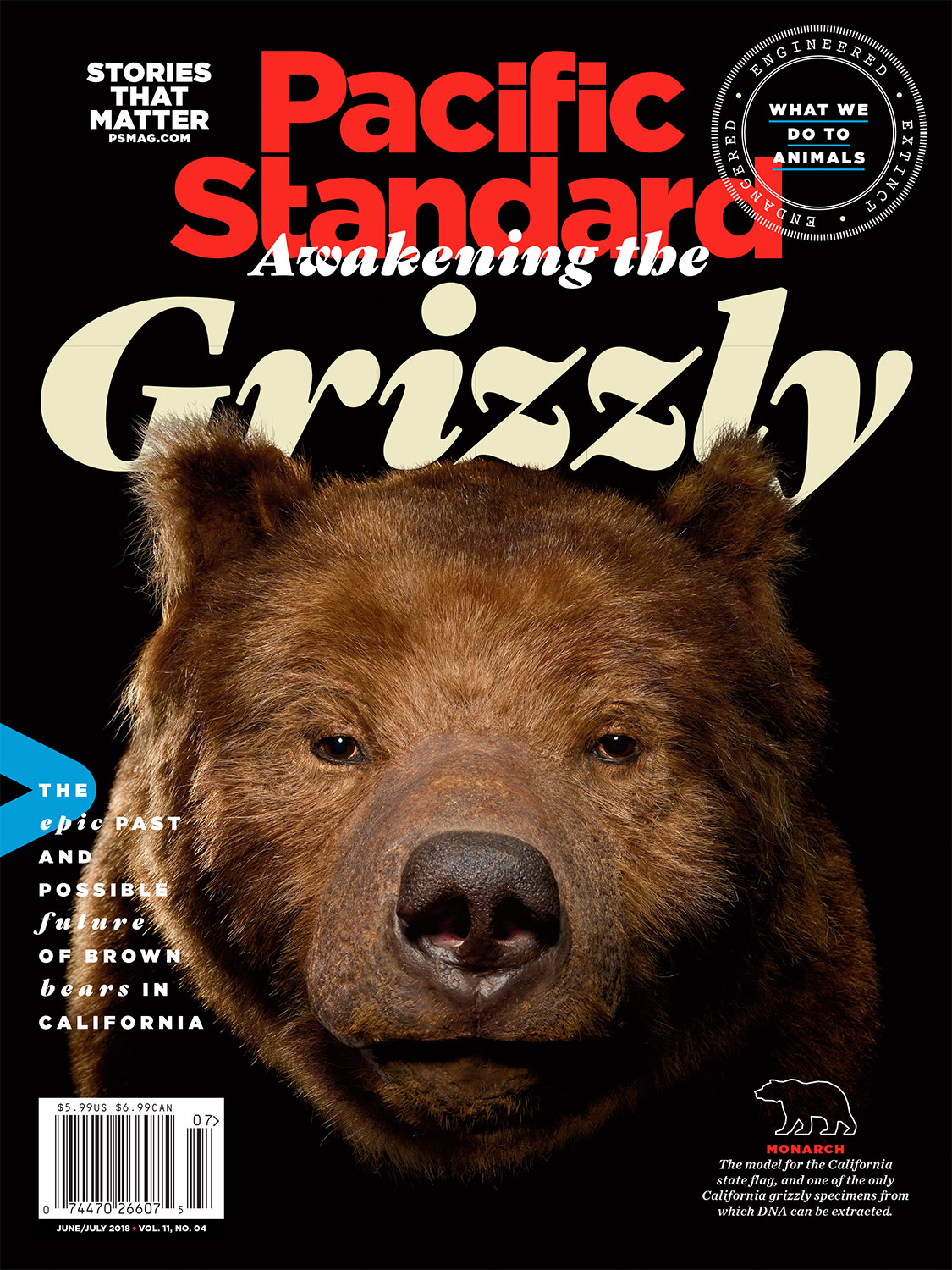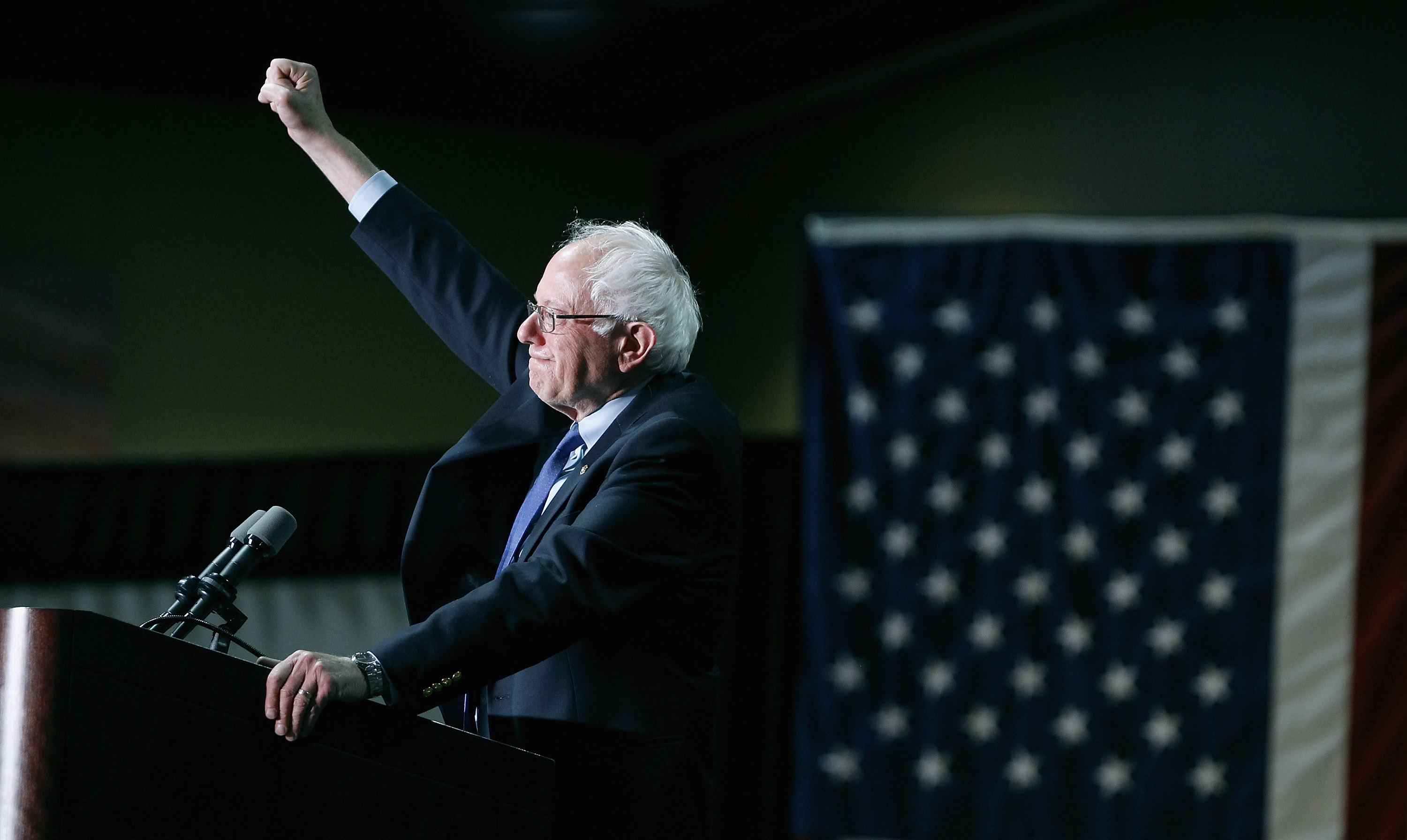En route from Pittsburgh to Morgantown, West Virginia, for a Bernie Sanders “Care Not Cuts” rally, my husband, daughter, and I wound through miles of forested hills. We emerged at Exit 152 and headed toward Morgantown’s Monongahela riverfront, past the West Virginia Office of Miners’ Health, Safety & Training, Region 1; past Kistner McGraw Hand to Shoulder Rehabilitation; past the Morgantown Vet Center; past Stacey’s Hot Spot nightclub (this one with the front windows blacked out). The day was a mild blend of cornflower blue, hay yellow, and deciduous green, the kind of day ideally spent by a creek. Nevertheless, we filed with hundreds of others into a windowless conference room at the Morgantown Event Center, shifting our feet on maroon carpet while we waited for Bernie to make his entrance.
The crowd consisted of ponytailed men with camouflage hats; young, bearded guys in straight-leg jeans and backwards gold-and-navy West Virginia Mountaineers caps; a smattering of fresh-faced college students; and middle-aged women in khakis and baggy tees, some of whom held poster boards announcing their chronic illnesses. Partners and friends photographed the women in front of a massive banner reading Improve the Affordable Care Act. Don’t Destroy It. There were a handful of Bernie die-hards from Pittsburgh who we’d seen on the highway down, their Subarus plastered with Feel the Bern paraphernalia. It was not a crowd that looked “political.” That is, it didn’t look like the crowd at the Hillary Clinton rallies I had attended in Pittsburgh, where people wore North Face jackets and chatted about standardized testing, or like the protests I attended in college, where students in hip glasses and Converse shoes chanted slogans and pumped fists. This rally—by nature of Bernie, or West Virginia, or the stakes of this particular legislation, or all three—felt distinct.
People were there for the same reason that many people now make daily calls to a representative whose name they’ve only recently learned: Many of the issues Americans brushed off as “political” before 2017 now feel morally, existentially urgent. Lives hang in the balance, and this means that ordinary West Virginians climb to a podium on a bright Sunday morning in front of hundreds of people to talk about their most personal, catastrophic moments.
Joel Beeson walked onstage to friendly waves and shouts of “Hi, Joel!”
“Hi!” he shouted back, as though we were all at a softball game.

(Photo: The Voorhes)
Joel—a graying, bespectacled West Virginia University journalism professor and father of five who has lived in Morgantown for the past 15 years—launched into the story of how he’d been born with a rare form of hemophilia and spent most of his childhood in and out of hospitals. In the 1980s, he got hepatitis C from a blood transfusion. The combination of his disorder and the infection, which severely weakened his liver, resulted in weekly spontaneous bleeding episodes. He was placed on a liver transplant list, but while waiting for a donor, his insurance policy reached its lifetime maximum and he was taken off the list. Then, the Affordable Care Act passed, lifting the lifetime maximum limits and saving his life. On October 29th, 2012, he received his transplant at the Cleveland Clinic. Rachel Fetty, now a Morgantown City Council member, was his living donor.
Beeson’s story, however, didn’t end there. This past year, he developed post-transplant lymphoma and underwent chemotherapy. He was in remission, but his future was newly, frighteningly uncertain. “I am here in front of you today only because of the dreaded Obamacare,” he said, shifting into a cinematic voice that evoked both ghostly villain and unexpected savior. “My story should not be extraordinary or rare in a country as great as ours. My story is the story of the profound generosity of a private citizen who courageously and unselfishly gave of herself to save another life, and a health-care system that puts people above greed.”
This conclusion—that Joel’s story is first that of a private citizen, and then that of a government intervention—reveals the heart of the problem of advocating for universal health care in West Virginia. Most of the people in this room presumably lean left politically, but their left is quite different from the left of the coasts. They live in a state that went overwhelmingly for Donald Trump, and a region that remains largely red. Their arguments must be shaped to the assumptions—encountered regularly in the media, at work, at school, on Facebook—of those contexts.
Speakers had to tacitly acknowledge that a majority of West Virginians see government health care and the intervention it represents as fundamentally un-American, even evil, while also making the case that many people’s lives in West Virginia depend and have long depended on this imagined evil. The speakers had to celebrate the power of the individual and his or her hard work, and yet also reveal the individual’s vulnerability by demanding that the system upon which he or she is dependent exercise basic moral integrity.
Shortly after Joel Beeson came Rusty Williams, who described himself as “living proof that the Affordable Care Act and Medicaid expansion is saving lives, every day.” Rusty is young, with red hair and a long red beard, a sleeve tattoo, and a polite West Virginia drawl. He immediately announced that he was diagnosed with cancer in 2012 and, working in a small business, couldn’t afford insurance. Flatly, he said: “I thought my life was over. I had accepted it.” He spent weeks looking for options while his cancer spread, until finally a Catastrophic Illness Commission found him insurance and saved his life. “Nobody should ever have to get a lawyer to get medical coverage!” he proclaimed, to the raucous agreement of the room. “They like to tout that we’re the moral compass of the world,” with the implied they being Washington, politicians, the people on television, and we the United States. “If that’s true, then our compass is broken and the ship is about to go over the falls.” His audience went wild. “Democrat, Republican, none of that stuff matters when it comes to health care: It’s a basic idea that our country, our tax dollars, we should take care of our own—we should take care of our people.”

(Photo: Ralph Freso/Getty Images)
Here was the quasi-religious rhetoric that seemed to invite the larger West Virginian audience to listen: Rusty spoke about how “the natural response when you’re in a dark place is to look for any little pinhole of light…. But what I realized was, those pinholes don’t exist … until you realize that you are the light. You light that darkness up.” The room was cheering and clapping, and people were pushing closer to the stage. “If we work together and we stand up for each other, we’ll light it up. And that’s what has to happen!”
Bernie emerged and was utterly Bernie, his Brooklyn brogue like a trusty and lovable car going up and down the same trodden hills. He spoke of the massive transfer of wealth from the working class to the richest people in the country. He cited the numbers, making them stories whose bottom line was grotesque greed. His twin themes were the pummeling of the working class and the moral outrage of the initial incarnation, dubbed “Trumpcare,” of several Republican attempts to repeal the ACA. “What happens to you if you have cancer, heart disease, diabetes, or any other life-threatening illness and you cannot afford to go to the doctor?” he asked the crowd, and from around the room came shouts: “You die! You die! You die!”
In that conference room was a scene that seemed both distinctly American—a grassroots, informal camaraderie amid the confessing of intimacies; a worship of individual possibility and story—and profoundly contrary to the persistent American belief in the ability of any one person to triumph independent of community. To create political change in West Virginia, the activists, leaders, and citizens in that room would have to reconcile these disparate ideals: the cherished independence of the individual, and the individual’s fundamental dependence on American institutions that have no clear mandate to value his or her life.
Afterward, my husband, daughter, and I took a walk along the riverfront in Morgantown and stumbled onto a bluegrass concert. The day settled into a peach-yellow dusk as families danced in front of the stage, the river swirling behind them. I had a vision of another America, where people did not have to stand up on Sunday morning to reveal their tragedies, where crowds were not chanting, “You die! You die!” It was a vision that didn’t hold long: Heading back to the car, we spotted one young man passed out under a bridge, another crumpled in front of a restroom. In the days, weeks, and months to come, Congress would struggle to pass one destructive health-care measure after another in spite of widespread opposition, and Bernie would introduce his plan for universal health care. Nothing would come to feel more certain, everything would become more divisive. Meanwhile, people did the little they could: stand up, tell their stories, confess their vulnerability before a government that every day seemed more distant from the needs of its people.
A version of this story originally appeared in the June/July 2018 issue of Pacific Standard. Subscribe now and get eight issues/year or purchase a single copy of the magazine.





